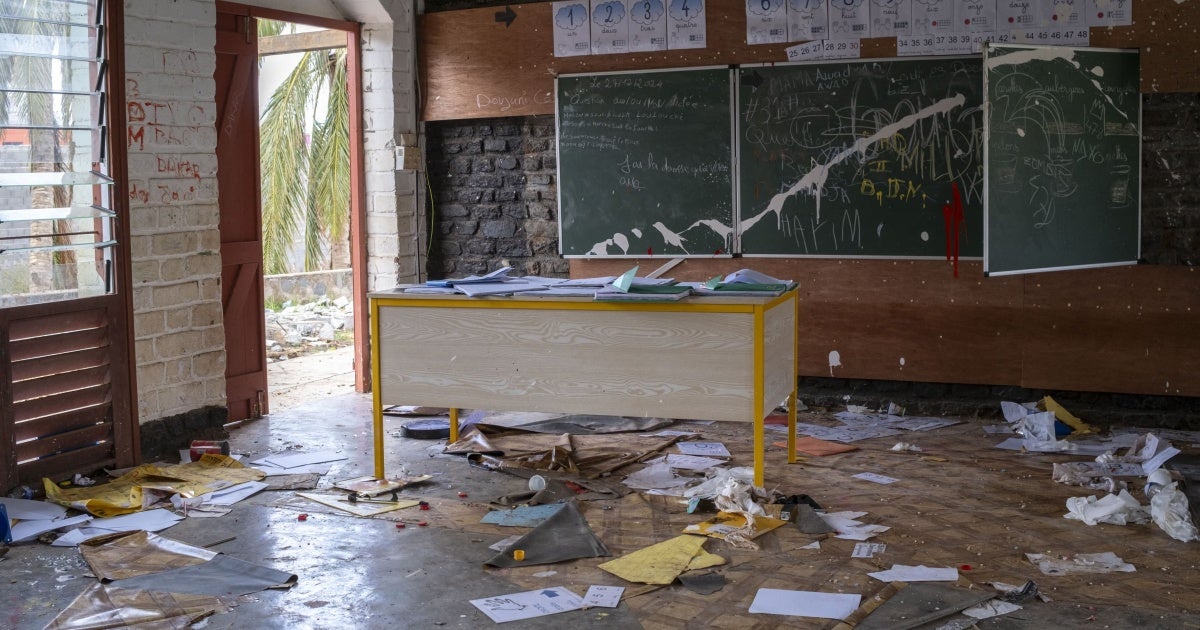
French Overseas Children Face Education Shortfall
A bill before France’s National Assembly for the reconstruction of the overseas department of Mayotte should include access to education and other core economic and social rights of children, Human Rights Watch said today.
Mayotte, in the Indian Ocean northwest of Madagascar, has long been neglected by French authorities, and its educational system has for years faced a lack of school facilities, overcrowding, and teacher shortages. Children with undocumented parents and others living in shantytowns are disproportionately likely to face barriers in school enrolment. A drought has caused frequent water shortages, and a devastating cyclone in December 2024 caused widespread destruction to homes, schools, and other infrastructure.
“Education is not only a right for all children, it is compulsory throughout France from age 3 to 16,” said Elvire Fondacci, advocacy officer at Human Rights Watch. “Yet thousands of children in Mayotte, due to their nationality or migration status, cannot effectively access education or other basic social support.”
Human Rights Watch met with more than 40 children and parents, as well as civil society organizations, independent institutions, teachers and education staff, and government and local officials during a 10-day research trip to Mayotte in May 2025.
Mayotte is one of 13 overseas territories of France, all legacies of its colonial past. It is France’s poorest department and one of the most disadvantaged parts of the European Union. More than 75 percent of its population lives below the poverty line.
Nearly half of Mayotte’s population is under age 18, and 8 out of 10 children live in poverty. With overcrowded schools and classrooms, Mayotte’s education system was under strain well before the 2024 cyclone.
A 2023 University of Paris-Nanterre study found that as much as nine percent of Mayotte’s school-age population were not enrolled in school. The French Defender of Rights found in October 2023 that as many as 15,000 children did not have access to a full school day in public school. Education is free, compulsory between the ages of 3 and 16, and by law should be available to all children in France regardless of migration status.
Primary education is largely the responsibility of municipalities, some of which have imposed additional burdensome administrative requirements for school enrolment. Some require newly issued birth certificates or documents to establish children’s addresses: paperwork that families living in informal settlements or with irregular status may not be able to obtain.
Some local authorities are also reluctant to build new schools, perceived as primarily benefitting children of immigrant families from the neighbouring Comoro Islands or encouraging further migration. Depriving children of their fundamental rights, including education, should never be used as a deterrent to migration, Human Rights Watch said. The French Defender of Rights observed at the beginning of June that shortcomings in Mayotte’s education system exacerbate and entrench inequality.
Fear of arrest by border police near schools and municipal offices discourages many families from accompanying their children to school or accessing essential public services such as vaccination, and makes school enrollment procedures more difficult.
Increasingly restrictive migration policies – even more so than in mainland France – that apply specifically to Mayotte mean an increasing number of people become undocumented at age 18, regardless of how long they have lived there, and even if they were born there. Children’s uncertainty about their future causes anxiety and leads some to leave school early.
A staff member at a local organization supporting out-of-school children said, “At 13 years old, some students are already asking whether it’s worth staying in school.”
Thousands of children in Mayotte live in the islands’ many informal settlements, often in makeshift dwellings lacking access to running water or electricity. Some students study by candlelight or using a phone flashlight; others leave their notebooks at school to avoid rain damage.
Children in all informal settlements often experience malnutrition, and teachers report that some students fall asleep in class or are unable to concentrate because they are hungry. Unlike in mainland France, where students receive a full lunch, most schools in Mayotte only provide a snack. For many students, this may be the only meal of the day.
“My parents can’t find rice anymore” since the cyclone, a 12-year-old girl said. “One day we eat, the next we don’t. It’s every other day. I eat the snacks at school.”
Other children whose families cannot afford the fee for the snacks – for instance, €65 per year in primary schools in Mamoudzou, Mayotte’s largest city – end up going without food at all. One 15-year-old student said: “It’s hard to live in a slum. If you haven’t paid for the snack, you don’t eat. It’s really hard to go to school when you’re hungry.”
Many children, including French children born in Mayotte, long-term residents without French citizenship, and recent arrivals, do not speak French as their first language and may have limited French proficiency. Failure to support these students and provide teacher training, and to recognize that the region’s linguistic diversity is in apparent contradiction with national education requirements, makes learning extremely difficult for students and poses additional challenges for educators.
Children of asylum seekers or other recently arrived migrants from Central and East African countries, including the Democratic Republic of Congo, Eritrea, Rwanda, and Somalia, live in particularly dire conditions in dilapidated tents in an informal settlement with no toilets for its hundreds of residents and no access to education.
The National Assembly will soon debate a bill setting forth the priorities and framework for a specific public policy regarding Mayotte’s reconstruction.
Lawmakers should ensure that children living in Mayotte can exercise their fundamental rights, including the right to education. National and local authorities should urgently ensure that schools are equipped to meet children’s basic needs, including access to drinking water, sanitation, nutritious food, and a safe learning environment, and end discriminatory practices in school without waiting for new legislation, Human Rights Watch said.
“The bill before the National Assembly is an opportunity to correct decades of underinvestment, mismanagement, and persistent lack of political will that have severely undermined education in Mayotte,” Fondacci said. “Ensuring the right to education for all children in France is not optional in Mayotte simply because it is an overseas territory.”
https://www.hrw.org/news/2025/06/19/france-many-children-in-overseas-territory-lack-education


